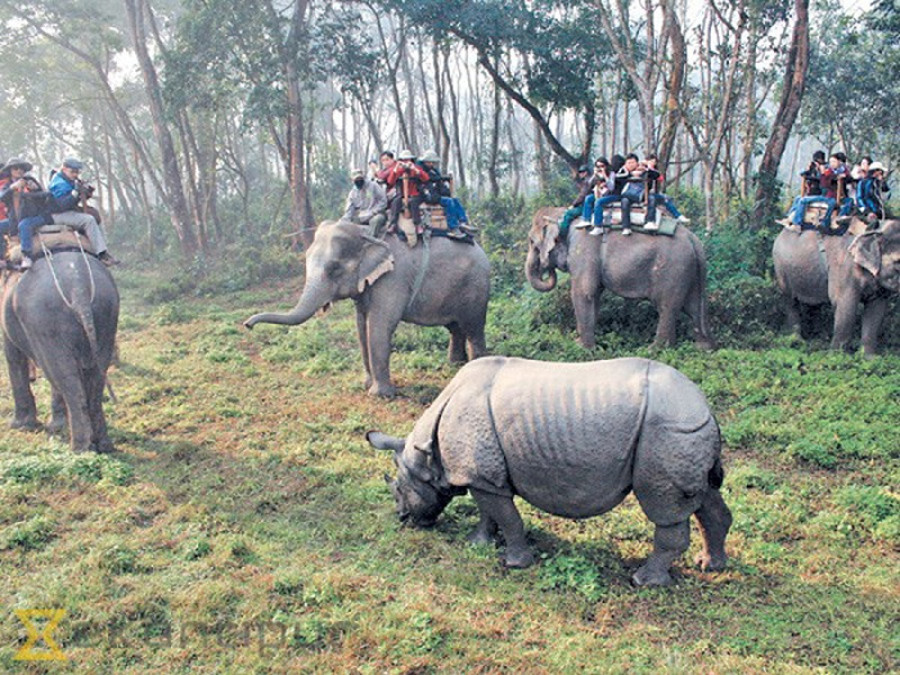National
Sauraha elephant keepers hope cooperative model to revive pandemic-hit safari business
Owners of privately-owned elephants agree to look after the animals together and share the safari income.
Chandan Kumar Mandal
It’s been one and a half decades since Narayan Bhattarai has been providing elephant-back rides to tourists in Sauraha—Nepal’s oldest jungle safari destination. His two elephants—Champakali and Ranikali—had been out of work since March when the country stopped issuing visas for foreign tourists and enforced a lockdown to contain the coronavirus spread.
Champakali and Ranikali would make four to five rides per day during peak tourist season, mainly in spring and autumn.
“The business was good,” recalled Bhattarai. “Even though we had limited the number of rides to morning and evening to allow the elephants to rest, the income was still good.”
Elephant keeping is a costly affair. Each elephant needs to eat 150-250 kg of food per day.
The cost of feeding, housing and providing medical service an elephant comes to around Rs80,000-85,000 per month.
“Despite high maintenance cost, elephant owners were still making a decent profit,” said Bhattarai, who earned around Rs 100,000 every month through elephant safari.
Now, the Covid-19 pandemic has upended Sauraha’s elephant safari business.
On March 11, the government decided to temporarily stop issuing on-arrival tourist visas to all tourists and subsequently imposed a nationwide lockdown on March 24.
For months, elephant owners in Sauraha have been struggling to feed their elephants as there are no tourists visiting the place these days. No tourists mean no business.
“We could neither bring them grass nor buy fodder from outside. Elephants need to go for a walk to find food. Some elephants have started to fall sick,” said Bhattarai. “Besides feeding elephants, we now have additional burden of their medical expenses.”
There are an estimated 200 elephants in Nepal, including those used by the government for jungle patrols. An adult elephant costs up to Rs8 million.
After months-long ordeal of taking care of elephants during the lockdown, elephant owners are now struggling to earn their living.
They have been holding discussions to revive their business and keep the elephants alive. And they just might have found a way to support the elephant safari business, which is in an all-time low due to the Covid-19 pandemic.
Under a revenue-sharing cooperative mode, the elephant keepers in Sauraha have agreed to look after the elephants together and share the safari income in the coming days.
“Since elephant safari is the most preferred activity among the tourists visiting Sauraha, we have to save these elephants and the safari tradition here,” Bhattarai said.
Rishi Tiwari, who has got two elephants Ichchhakali and Begumkali, is counting on the cooperative business model to succeed.
“If we can manage our elephants through a cooperative model, then it is good for all elephant owners who have been struggling for months now,” said Tiwari, who is also the president of United Elephant Cooperative Limited. “The existing cooperative is for administrative works and serves as a union for elephant ride providers. The new cooperative will take care of the elephants and manage the safari business.”
As per the plan, all privately held elephants will be stabled together and mahouts and other staff will be hired to tend to the animals and look after the business.
“All the elephants will be fed and taken care of together. The income will also be shared among all the owners,” said Tiwari. “Most importantly, the loss will also be equally borne by all the owners. Dying of an elephant can be a financial disaster to an owner. This modality is our vision. It will be easier to operate as well.”
If implemented, all the elephants will be categorised and used for three purposes—sanctuary, safari and breeding.
According to Tiwari, old elephants will be kept in a sanctuary for visitors to see, fit elephants will be used for safari and the young ones, especially female calves, will be fed and nurtured for the breeding purpose.
“The last six months have been tough for all of us. Now, if we want to sustain the business and save our elephants, we must think in a new manner,” said Tiwari. “At least, we can save our elephants through this joint effort.”
Since the pandemic, many elephant owners, who used to keep rented elephants from India, have returned their elephants while others were forced to sell their animals.
The number of privately owned elephants have come down to 47 from 55 in the recent months.
“Under the cooperative model, there won’t be competition among elephant owners, but they will work as a team. Elephant safari also means the source of income for community forests,” said Bhattarai.
With the opening of Chitwan National Park and an expected movement of domestic tourism, the elephant owners do not want to miss the business opportunity.
“Once the Covid-19 is over, tourism will bounce back. Visitors will once again come to Sauraha and go for elephant safari,” said Bhattarai. “But our main concern is saving the elephants. Without the safari season, Sauraha will lose its identity and will not be the same anymore.”




 22.3°C Kathmandu
22.3°C Kathmandu















